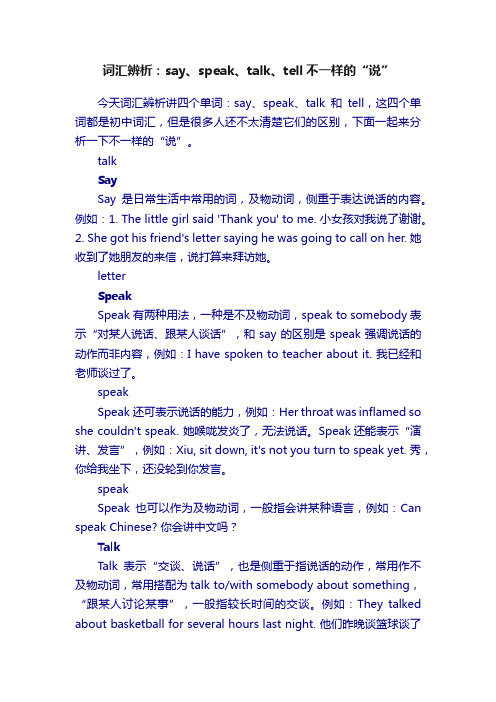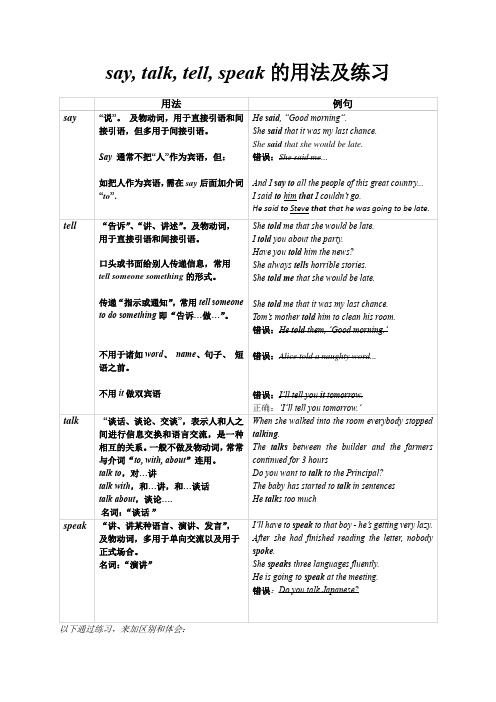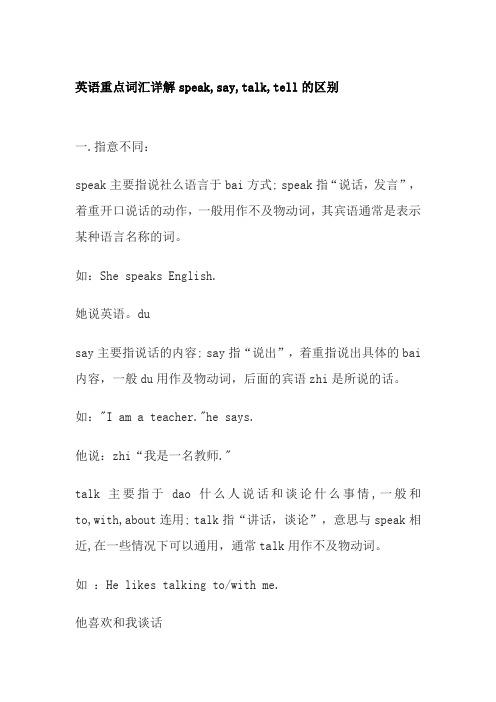(完整版)say-tell-talk-speak的用法和区别
词汇辨析:say、speak、talk、tell不一样的“说”

词汇辨析:say、speak、talk、tell不一样的“说”今天词汇辨析讲四个单词:say、speak、talk和tell,这四个单词都是初中词汇,但是很多人还不太清楚它们的区别,下面一起来分析一下不一样的“说”。
talkSaySay是日常生活中常用的词,及物动词,侧重于表达说话的内容。
例如:1. The little girl said 'Thank you' to me. 小女孩对我说了谢谢。
2. She got his friend's letter saying he was going to call on her. 她收到了她朋友的来信,说打算来拜访她。
letterSpeakSpeak有两种用法,一种是不及物动词,speak to somebody表示“对某人说话、跟某人谈话”,和say的区别是speak强调说话的动作而非内容,例如:I have spoken to teacher about it. 我已经和老师谈过了。
speakSpeak还可表示说话的能力,例如:Her throat was inflamed so she couldn't speak. 她喉咙发炎了,无法说话。
Speak还能表示“演讲、发言”,例如:Xiu, sit down, it's not you turn to speak yet. 秀,你给我坐下,还没轮到你发言。
speakSpeak也可以作为及物动词,一般指会讲某种语言,例如:Can speak Chinese? 你会讲中文吗?TalkTalk表示“交谈、说话”,也是侧重于指说话的动作,常用作不及物动词,常用搭配为talk to/with somebody about something,“跟某人讨论某事”,一般指较长时间的交谈。
例如:They talked about basketball for several hours last night. 他们昨晚谈篮球谈了几个小时。
say, talk, tell, speak的区别、用法及练习(附答案)

say, talk, tell, speak的用法及练习练习一:用say, talk, tell, speak的适当形式填空。
1.Don't him about our plans.2.I waited for an answer, but she didn't a word.3.He that he would wait for me at the library.4.He us that he was going to buy a new car.5.Do you English?e here, Mike. We need to .7.To you the truth, I don't remember anything.8.Did the director at the conference?9.Do you know how to good-bye in Arabic?10.We spent the whole evening about old friends.11.They nothing to me.12.What did Eric when he saw the new bike?13.She ____ several languages.14.He ____ for about an hour.15.He ____ a lot of nonsense.16.It was an interesting ____.17.He's always ____ behind people's backs.18.If it's worrying you, you should ____ your mind.19.There's a serious problem- I think we should ____.20.We ____ things over and everything's OK between us now.21.It's just ____- they'll never actually do it.22.She ____ in her sleep.23.It goes without that we will pay for the expenses.24.It's no use expecting me to because I promised I'd keep the secret.25.Let's he offers the job to you. Would you accept it?26.Don't anyone. We don't want the neighbours to start talking.27.Pull yourself together and stop nonsense.28.I don't know how we will communicate. I don't a word of Chinese.29.She always her prayers before lunch.30.Let's invite Maggie as well. Otherwise I know you'll spend the whole eveningfootball.31.He is never afraid of his mind.32.He was punished for some naughty words.33.What would you to a week in the Bahamas?34.Let's hope you are right. Time will .35.We've all him to stop smoking.36.Did the children Goodbye to you? why you're late.38.She still hasn't her parents she was engaged.39.Everyone he is strange, but I can tell it's not true.40.When I was young, children used to the truth to their parents练习一答案:1.tell2. say3.said4.told5.speak6. talk7. tell8. speak9. say 10. talking 11.said 12.tell 13.speaks 14.talked 15.talks 16.talk 17.talking 18.speak 19.talk 20.talked 21.talk 22.talks 23. saying 24. speak 25.say 26.tell 27.talking 28.speak 29.says 30.talking 31.speaking 32.saying 33.say 34.tell 35.told 36.say 37.Tell 38.told 39.says 40. tell练习二:选择题1. We weren't ___________ about these new requirements.A. toldB. saidC. talked2. You'll have to ___________ to my manager about that.A. sayB. speakC. tell3. No, that's not what I ________ to him.A. saidB. toldC. both are correct4. Let's ________ over lunch.A. tellB. sayC. talk5. Some of the things he ________ worry me.A. spokeB. talkedC. said6. You should ________ her that we're going to be late.A. tellB. speakC. say7. Do you ________ English?A. talkB. speakC. tell8. I don't know what to ________ to you.A. Both are correctB. sayC. tell9. He has been ________ lies to everyone.A. talkingB. sayingC. telling10. Let's ________ sports. = Let's talk about sports.A. speakB. talkC. both are correct11. I didn't hear you. What did you ___________?A. sayB. tell C talk12. I didn't hear you. What did you ___________?A. talkedB. toldC. said13. I'm going to ________ to him about this.A. talkB. speakC. both are ok14. I'm going to ________ him the truth.A. talkB. tellC. both are correct15. She always knows the right thing to ________.A. speakB. talkC. say16. Don't ________ to your grandfather in that tone!A.SpeakB. tellC. say17. I ________ her that I loved her.A. toldB. saidC.18. She and I ________ all night.A. toldB. both are correctC. talked19. Hi, this is Robert. We ________ on the phone last Tuesday.A. toldB. saidC. spoke20. ___________ up! I can't hear you!A. SpeakB. TalkC. Tell练习二答案:1.A2.B3.A4.C5.C6.A7.B8.B9.C 10.B 11.A 12.A. 13.C 14.B 15.C 16.A 17.A 18.C. 19.C 20.A。
英语中的“说”speak,talk,say,tell的用法讲解

英语中的“说”speak,talk,say,tell的用法speak、talk、say、tell 都有“说”的意思,但它们的意义和用法不同。
1.speak“讲话、发言、演说”,后面跟人做宾语要加介词to, speak 作及物动词时后面跟各种语言;Can you speak French? 你会说法语吗?Who will speak at the meeting? 谁将在会上发言?May I speak to John, please? 我能和约翰讲话吗?或请找约翰接电话好吗?常用的短语:speak out 畅所欲言,直言不讳的说speak up 大声说,毫不犹豫地说出2.talk“谈话、闲谈”,是不及物动词, 后面跟人的时候用介词with、to 等, 后面跟“事情”要用到介词about ;Who is talking to your mom? 谁再和你妈妈聊天?Mr. Chen wants to talk to you. 陈老师要和谈谈。
What are they talking about? 它们在聊啥?talk 常见的短语还有:talk down :以高声或连续的话说出talk into 说服......做......talk of 谈到,表示要talk over 讨论(事情)3.say 是及物动词,表示说的内容,即说了什么话;What did you say? 你刚才说啥来着?He said he would come to join us. 他说他回来加入我们。
Say no to smoking. 拒绝吸烟。
What he said made me very sad. 他说的话叫我很伤心。
很炫酷的say 口语:You said it.[美]正是这样; 你说对了; 我同意。
Say away! 说出来吧!say for oneself为自己辩护; 为自己找借口say no 拒绝, 反对Say no more! 不用再说下去了! 你的意思我全懂了!Say on! 继续说吧!say out直说, 坦率说出say over背诵say to oneself自言自语; 心里想say when酒斟够了请说一声[喻]停止, 制止Says you![俚]我不信! 去你的! 胡说!4.tell 表示“讲述、告诉”是及物动词, 后面首先要跟人, 然后再跟从句或者介词短语等。
say-tell-talk-speak的用法和区别word版本

词汇辨析say、tell、speak、talk的区别1、say意为“说出”“说过”,强调说话的内容,也可与to连用,say to sb.意为“对某人说”。
eg. He often says“hello”to me with a smile. 他常笑着向我问好。
I can say it in English. 我能用英语说它。
He says to me,“I like my hometown.”他对我说:“我喜欢我的家乡。
”2、tell意为“讲述”“告诉”,作及物动词时,指把一件事或一个故事讲出来,有连续诉说之意。
如:tell the truth说实话,tell a story讲故事。
tell也可接双宾语结构或复合宾语结构。
如tell sb. sth.告诉某人某事;tell sb. about sth.告诉某人关于某事;tell sb.(not)to do sth.告诉某人(不要)去做某事。
eg.-What did your mother tell you just now? 刚才你妈妈告诉你什么了?-She told me not to ride a bike quickly. It's too dangerous.她告诉我不要快骑自行车,那太危险了。
Please tell me something about yourself.请告诉我关于你自己的一些事情。
3、speak的意思是“说话”,作不及物动词时,通常指说话的能力和方式;作及物动词时,其后的宾语为某种语言。
speak to sb.表示“同某人说话”。
eg. Would you like to speak at the meeting? 你要在会上发言吗?Bob speaks Chinese quite well. 鲍勃汉语说得相当好。
Joe can speak a little Chinese. 乔能说一点儿汉语。
May I speak to Mr. Green? 我可以同格林先生通话吗?(此句常用于打电话用语中)He is speaking to Lily. 他正在和莉莉说话。
talk、tell、say、speak的用法

=I can’t tell you the bad news. My mother tells tell sb. sth./ tell sth. to sb./tellsb.about
sth tell sb. to do sth. tell a story讲故事 tell the truth 说真话 tell a lie说谎 tell : 辨别,说出区别 tell A from B
1. say+ 说话内容 2. say to sb. 3. It is said that... 意为“据说”。如: It is said that he could stay under the
water for a long time. 据说他能呆在水里 很长时间。
1.▲ speak作及物动词,意为“说”“讲”,其宾 语常是某种语言。如:speak French说法语;
tell the differences between A and B
练习一:
1. Did he _____ it in English? A. tell B. speak C. say D. talk 2. The teacher _____ us to finish the
homework in time. A. tells B. speaks C. says D. talks 3.What would you like to ______ us about
(完整)say,speak,tell,talk的区别和用法

say,speak,tell,talk的区别和用法speak讲语言 speak to sb about sthtell告诉 tell sb sth/tell sth to sbsay说 say sth to sbtalk交谈,聊天 talk to sb/talk sb about sthsay ,speak talk 和tell辨析。
▲ say一般作及物动词用,着重说话的内容,它的宾语可以是名词,代词或宾语从句。
eg: He can say his name。
他会说他的名字。
Please say it in English. 请用英语用。
She`s saying ,Don`t draw on the wall。
她在说“别在墙上画”。
▲ speak强调说的动作,不强调所说的内容。
作及物动词时,常以某种语言作宾语。
作不及物动词时,常见的搭配形式有:speak of something/somebody谈到某事(某人)speak to sb 跟某人讲话,此外speak还可用于在较为正式的场合了表演讲或演说。
Can you speak Japanese?你会说日语吗?She is speaking to her teacher。
她正在跟她的老师说话。
He spoke at the meeting yesterday. 他昨天在会上讲了话。
▲ talk 一般为不及物动词,意思是“交谈,谈话,着重强调两具之间的相互说话。
eg: She is talking with Lucy in English。
她正在和露茜用英语交谈.What are you talking about? 你们在谈论什么?The teacher is talking to him。
老师正在和他谈话。
▲ tell常作及物动词,意为“讲述,告诉,动词常跟双宾语。
tell sb sth=tell sth to sb告诉某人某事。
eg: He is telling the children a story.他正在给孩子们讲一个故事.Did you tell her the news?=Did you tell the news to her?你把这个消息告诉她了吗?also, too,either的区别和用法too和alsotoo作为“还"的意思时,用在句末。
英语重点词汇详解speak,say,talk,tell的区别

英语重点词汇详解speak,say,talk,tell的区别一.指意不同:speak主要指说社么语言于bai方式; speak指“说话,发言”,着重开口说话的动作,一般用作不及物动词,其宾语通常是表示某种语言名称的词。
如:She speaks English.她说英语。
dusay主要指说话的内容; say指“说出”,着重指说出具体的bai 内容,一般du用作及物动词,后面的宾语zhi是所说的话。
如:"I am a teacher."he says.他说:zhi“我是一名教师."talk主要指于dao什么人说话和谈论什么事情,一般和to,with,about连用; talk指“讲话,谈论”,意思与speak相近,在一些情况下可以通用,通常talk用作不及物动词。
如:He likes talking to/with me.他喜欢和我谈话He is talking about learning English.他正在谈论关于学许英语得事情tell主要指告诉的内容,也可一和to连用。
tell指“告诉”,是直接给对方讲或以间接的方式转诉某事,在多数情况下,tell 的后面通常接双宾语,在少数情况下可用简单宾语。
如:He tells me a secret.他告诉我一个秘密。
也可以说He tells a secret to me.二.侧重点不同:1、say最普通常用词,指用语言表达思想,着重所说的内容。
2、speak侧重于说话动作的本身,着重说话的能力而不在内容,比如能说某种语言。
3、talk普通用词,侧重指与人交谈时的连续说话,可指单方面较长谈话,和speak一样,着重说活动作而不侧重内容。
4、tell指告诉或讲述。
三、用法不同1、tellv. (动词)1)tell的基本意思是用语言或文字“告知”“告诉”“讲述”某事,强调思想的表达,而不强调表达的方式。
引申可表示“吩咐”“嘱托”“命令”“确定”“区分,辨别”“泄露秘密”“猜测”“产生效果”等。
初中完型易混动词辨析say--talk--tell--speak的区别、用法和练习(附答案)资料

初中完型易混动词辨析最新s a y--t a l k--t e l l--s p e a k的区别、用法和练习(附答案)资料-CAL-FENGHAI-(2020YEAR-YICAI)_JINGBIANsay, talk, tell, speak的用法及练习用法例句say “说”。
及物动词,用于直接引语和间接引语,但多用于间接引语。
Say通常不把“人”作为宾语,但:如把人作为宾语,需在say后面加介词“to”.He said, “Good morning ”.She said that it was my last chance.She said that she would be late.错误:She said me...And I say to all the people of this great country...I said to him that I wouldn't ’t go.He said to Steve that that he was going to be late.tell “告诉”、“讲、讲述”。
及物动词,用于直接引语和间接引语。
口头或书面给别人传递信息,常用Tell someone something的形式。
传递“指示或通知”,常用tell someoneto do something即“告诉⋯做⋯”。
不用于诸如 word 、 name 、句子、短语之前。
不用it做双宾语She told me that she would be late.I told you about the party.Have you told him the news?She always tells horrible stories.She told me that she would be late.She told me that it was my last chance.Tom’s mother told him to clean his room.错误:He told them, ‘Good morning.’错误:Alice told a naughty word...错误:I’ll tell you it tomorrow.正确:‘I’ll tell you tomorrow. ’talk “谈话、谈论、交谈”,表示人和人之间进行信息交换和语言交流,是一种相互的关系。
- 1、下载文档前请自行甄别文档内容的完整性,平台不提供额外的编辑、内容补充、找答案等附加服务。
- 2、"仅部分预览"的文档,不可在线预览部分如存在完整性等问题,可反馈申请退款(可完整预览的文档不适用该条件!)。
- 3、如文档侵犯您的权益,请联系客服反馈,我们会尽快为您处理(人工客服工作时间:9:00-18:30)。
词汇辨析
say、tell、speak、talk的区别
1、say意为“说出”“说过”,强调说话的内容,也可与to连用,say to sb.意为“对某人说”。
eg. He often says“hello”to me with a smile. 他常笑着向我问好。
I can say it in English. 我能用英语说它。
He says to me,“I like my hometown.”他对我说:“我喜欢我的家乡。
”
2、tell意为“讲述”“告诉”,作及物动词时,指把一件事或一个故事讲出来,有连续诉说之意。
如:tell the truth说实话,tell a story讲故事。
tell也可接双宾语结构或复合宾语结构。
如tell sb. sth.告诉某人某事;tell sb. about sth.告诉某人关于某事;tell sb.(not)to do sth.告诉某人(不要)去做某事。
eg.-What did your mother tell you just now? 刚才你妈妈告诉你什么了?
-She told me not to ride a bike quickly. It's too dangerous.
她告诉我不要快骑自行车,那太危险了。
Please tell me something about yourself.请告诉我关于你自己的一些事情。
3、speak的意思是“说话”,作不及物动词时,通常指说话的能力和方
式;作及物动词时,其后的宾语为某种语言。
speak to sb.表示“同某人说话”。
eg. Would you like to speak at the meeting? 你要在会上发言吗?
Bob speaks Chinese quite well. 鲍勃汉语说得相当好。
Joe can speak a little Chinese. 乔能说一点儿汉语。
May I speak to Mr. Green? 我可以同格林先生通话吗?
(此句常用于打电话用语中)
He is speaking to Lily. 他正在和莉莉说话。
4、talk的意思是“谈话,谈论”,指相互之间的谈话,一般用作不及物动词,与介词to或with连用,表示“与……交谈”。
而谈及关于某人或某事时,后接介词of或about.
eg. They are talking on the phone. 他们正在电话中交谈。
My mother is talking with my teacher. 我妈妈正在和我的老师谈话。
We are talking in English.我们正用英语交谈。
What are they talking about? 他们正在谈论什么?
We talked about this problem for hours. 我们就这个问题谈了好几个小时。
检测:
用say、tell、speak、talk 的适当形式填空。
1. Excuse me .Can you ___________ me the way to the post office ?
2.My granny often ___________ me about her lives in the old age.
3. Many people in China can ___________ a little English now .
4.Who can ___________ us the differences between the words ?
5.What do you ___________ when you meet your friends in the morning ?
6.Can you ___________ it clearly ?
7.Don’t___________ with others when someone answers the teacher’s questions.
8. We are ___________ about our homework. Do you join us ?
10. Our headmaster is ___________ in the meeting now .
二、阅读理解
Most people who work in the office have a boss (老板). So do I (我也是). But my boss is a little unusual. What's unusual about him? It's a big dig. Many men have dogs, but few men bring their dogs to the office every day. My boss's dog. Robinson, is big and brown. My boss brings him to work every day. He takes the dog to meetings and he takes the dog to lunch. When there is telephone call for my boss, I always know if he is in the office. I only look under his desk. If I see something brown and hairy (毛绒绒的) under it, I know my boss is somewhere in the office. If there is no dog , I know my boss is out.
1. People _________bring dogs to the office.
A. usually
B. often
C. seldom (几乎不)
D. sometimes
2. My boss is Robinson's ________.
A. boss
B. master
C. classmate
D. teacher
3. Robinson goes to meetings _________ my boss.
A. for
B. without
C. instead of (代替)
D. with
4. Robinson is always under the desk if the boss is _________.
A. in the office
B. at meetings
C. out of the office
D. out of work
5. The passage tells us the boss _________ the dog very much.
A. looks like
B. hates (恨)
C. likes
D. trust(信任)。
